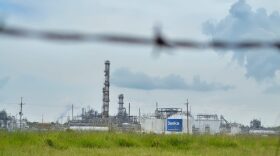-
After a proclamation from President Donald Trump, two facilities located in LaPlace, Louisiana will be allowed to ignore federal regulations meant to curb harmful pollutants.
-
The Institute of Museum and Library Services said the grant highlighting Black history and culture “no longer serves the interest of the United States.”
-
St. John the Baptist Parish doesn’t allow construction of medical marijuana pharmacies.
-
The Interior Department withdrew St. John the Baptist Parish’s eligibility for becoming a National Historic Landmark to boost economic development. But it might not work.
-
Reconnecting the dying swamp to fresh river water is vital for the health of the swamp’s cypress-tupelo forest, which minimizes storm surge damage for communities in St. John the Baptist, St. James, Ascension and Livingston Parishes.
-
The St. John the Baptist Parish School Board will shutter a predominantly Black elementary school that sits on the fenceline of a chemical plant. The decision came after eight years of pressure from community groups, federal agencies and lawyers.
-
Greenfield Exports LLC canceled plans to build a grain elevator in St. John the Baptist Parish after a lengthy permit process with the U.S. Army Corps of Engineers.
-
The NAACP Legal Defense Fund is asking a federal judge to require St. John the Baptist Parish School Board to relocate students from an elementary school located right next to a chemical plant.
-
Community groups in St. John the Baptist Parish partnered with an eco-friendly business to encourage students to pursue environmentally sustainable careers.
-
Land on the parish’s West Bank intended as the location for the Greenfield Grain Terminal will remain residential until the court orders otherwise.

Play Live Radio
Next Up:
0:00
0:00
Available On Air Stations









